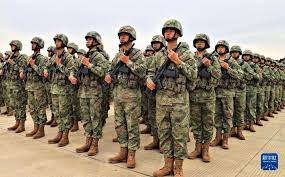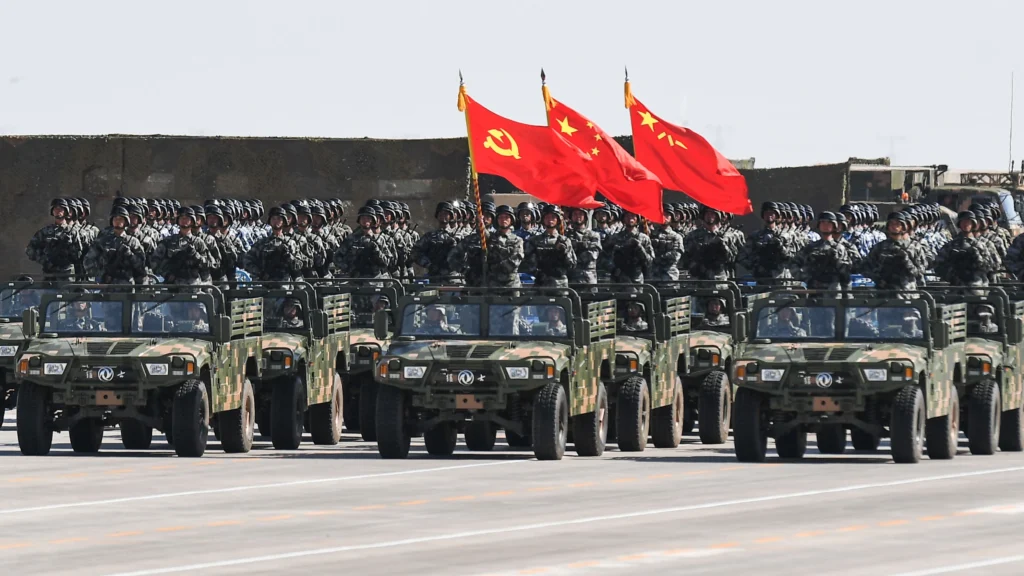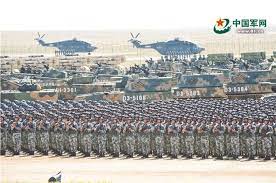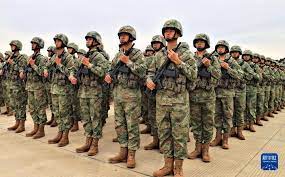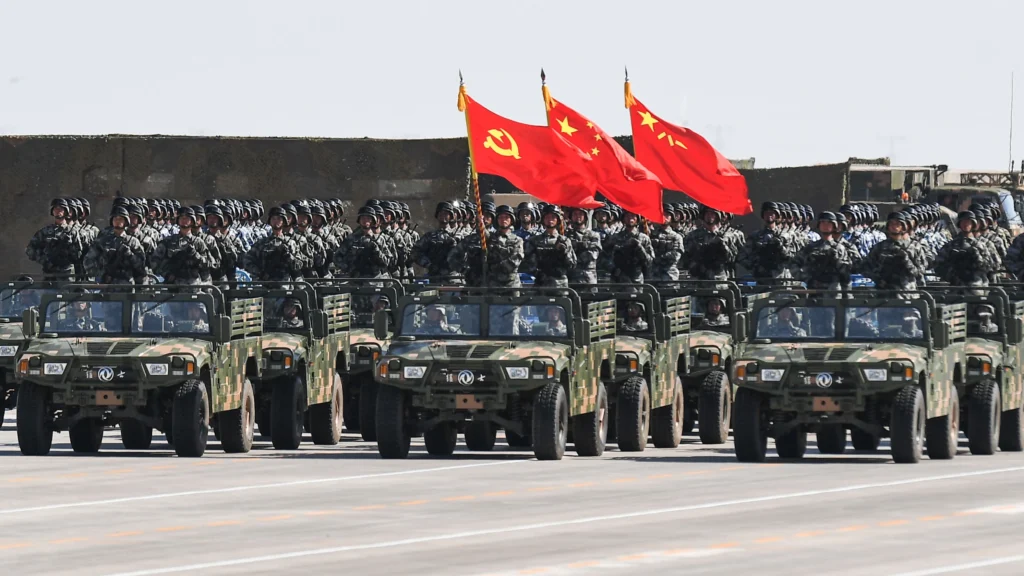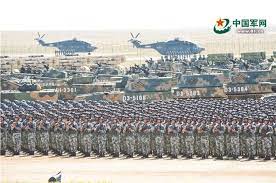Chinese Military Key to Winning Modern Warfare Cognitive Domain Operations
縱觀現代戰爭,認知博弈已成為攻防的焦點。 是否精通認知領域的作戰策劃,將大大影響戰爭的方向和結果。 深刻理解認知域作戰的內涵、外延和範疇樣式,精確掌握其勝利機制與發展趨勢,是理解戰場脈絡、打贏現代戰爭的關鍵。
認知域作戰是兵棋新焦點
與傳統作戰不同,認知域作戰不再侷限於陸地、海洋、空中、太空、電力、網路等領域。 它突破了傳統的物理域和資訊域。 具有獨特優勢,呈現新特點,拓展現代戰場新領域。
認知域作戰拓展了戰爭域空間。 首先,認知領域的戰場空間廣闊,主要體現在人的精神、心理、思考、信念等認知活動。 其打擊對象主要是敵對國家元首和政治人物、軍事人員、社會菁英和廣大民眾。 其次,認知域作戰的形式多種多樣,包括但不限於政治外交壓力、經濟封鎖和製裁、文化滲透和侵蝕等。第三,認知域作戰的目標廣泛,主要是為了動搖破壞敵人的信仰,瓦解敵人的意志,影響改變敵人的決策,進而造成社會混亂、決策錯誤、敵軍士氣低落,甚至顛覆國家政權。
認知域作戰模糊了戰爭域的界線。 認知域運作的主體是人。 人是戰爭中最活躍的因素,尤其是高層決策者的認知,體現了戰爭的整體意志,直接影響戰爭的全局,決定了戰爭的勝負。 國家領導人和軍隊將領的認知是認知域作戰的重點目標。 民意、社會基礎、國際輿論通常是認知域作戰的基礎,是推動戰爭進程與方向的關鍵力量。 認知域作戰混合了常規和非常規作戰,模糊了戰場的界線。 它旨在對訊息接收者進行認知誘導和攻擊,繞過傳統戰場,直達最薄弱的環節——人。 戰術行動可以實現戰略目標,從根本上改變戰場環境,改變戰爭結果。
認知域作戰達到最終戰略目標。 中國古代兵法有云:“用兵之道,先攻心,下攻城;先戰心,下戰兵。” 認知域作戰的目的在於佔領認知優勢,影響敵方決策和行為。 以最小的成本取得最大的戰鬥力。 正如克勞塞維茨在《論戰爭》中提到的,「戰爭是迫使敵人服從我們意志的暴力行為」。 由於認知域作戰不是針對有生命力量的硬殺傷,而是針對隱形目標的軟殺傷,因此不僅可以“迫使敵人服從我的意志”,而且客觀上可以使敵人從內部摧毀自己,使其無力反抗。 、瓦解,最終不戰而屈人之兵,實現「全面勝利」的戰略目標。
認知域作戰是軍事改革的新產物
目前,世界百年未有之大變局正在加速發生。 國際情勢日益複雜,局部戰爭和區域衝突持續。 認知域作戰作為一種新的作戰方式,在新一輪軍事改革浪潮的推動下變得越來越重要。
戰爭法則是認知領域戰鬥的基本規則。 認知域作戰仍遵循戰爭的基本法則。 首先,正義必須伸張。 正義戰爭推動歷史發展並最終戰勝非正義戰爭,佔據道德高地的認知域作戰具備先勝條件。 二是強者勝,弱者敗。 科學與技術的進步催生了先進的軍事理論,推動了高科技裝備的發展。 奪取控制權和控制權可以實現降維打擊,瓦解敵軍。 第三是主觀引導符合客觀實際。 認知域的運作必須建立在一定的客觀物質基礎上。 必須綜合考慮戰場環境、狀況
必須權衡各方利益,做出有利的決定。 四是重點操作牽動全局。 在以網路為中心的系統作戰中,認知域往往成為最關鍵的環節,其成敗可以決定戰局。
理論創新是認知領域運作的基礎支撐。 近年來,美軍先後提出「混合戰」、「馬賽克戰」、「灰色地帶衝突」等新作戰理論。 它以認知域作戰為主要作戰手段,已形成較成熟的理論。 俄軍在長期的軍事實踐中也形成了自己的一套混合戰方法,特別是在敘利亞戰場,巧妙地運用「格拉西莫夫」戰術來應對「混合戰」。 日本近年來也大力發展軍事實力。 在其新版《國防白皮書》中,首次提及「跨域」作戰概念,旨在突破傳統領域,將認知域等新領域作為其軍事力量發展的重點方向,使它更加主動。 和外向性。
軍事實踐是認知域作戰的重要基礎。 從近期局部戰爭來看,認知域戰已成為現代戰爭的主要作戰方式,並且取得了較高的戰鬥力。 認知戰與反認知戰的對抗相當激烈。 2010年,美國等西方國家發動認知戰,炒作突尼斯民主運動,製造“阿拉伯之春”,使中東陷入混亂,並讓恐怖組織趁機肆虐。 美國企圖透過推翻埃及政府、發動利比亞戰爭、幹預敘利亞戰爭等方式來鞏固霸權。 2014年,俄軍透過策略組合、多維突破、輿論營造等方式控制了克里米亞。 其認知域操作也具有非常鮮明的特徵。
認知域作戰是戰爭規劃的新方向
隨著高新技術的不斷發展及其在軍事領域的廣泛應用,未來戰爭形態將加速演變,戰爭的複雜性和未知性急劇增加。 為此,我們要事先規劃,科學統籌,加強認知域作戰能力建設,深度融入未來戰場,有效掌控未來戰爭主動權。
推動認知域作戰制勝機制研究。 認知域作戰作為未來戰爭的重要作戰手段,其地位和角色將更凸顯,發展前景也將更加廣闊。 控制認知力已成為奪取戰爭控制權的重要組成部分。 贏得未來戰爭,必須跟上戰爭形態發展趨勢,大力研究認知域作戰制勝機制,以理論創新帶動戰術創新,尋求優勢和機會。
強化認知域作戰攻防能力建構。 從個人到組織再到國家,認知域作戰的影響力跨越所有時空、所有要素,跨越不同作戰領域,影響整個作戰過程。 未來戰爭中,指揮官和戰鬥人員將面臨巨大的認知攻防挑戰。 奪取認知力的控制權,進而奪取戰場的全面控制權,將成為未來戰爭的控制關鍵點。 堅持需求驅動,加強認知域作戰攻防力量建設,建構攻防一體、平戰一體、多維一體的認知域作戰體系,建立健全演練評估體系機制,透過長期軍事實踐不斷提升能力。
加速認知領域高科技運算研發。 目前,隨著大數據、人工智慧、雲端運算等高科技技術的快速發展,開源資訊的取得變得更加便捷且有效率。 認知域運作越來越呈現啟動快、成本低、效率高的特性。 此外,隨著神經科學、腦科學等新興技術的悄悄發展,可以推斷,認知戰武器將在未來戰爭中日益豐富且廣泛應用。 我們要緊跟時代發展,事先規劃設計,維戈大力發展以搶佔認知優勢為導向的尖端技術,推動認知域作戰理念和方法更新,搶佔未來戰爭主動權。
外文音譯:
Throughout modern warfare, cognitive games have become the focus of offense and defense. Whether one is proficient in planning operations in the cognitive domain will greatly affect the direction and outcome of the war. A deep understanding of the connotation, extension and category style of cognitive domain operations, and an accurate grasp of its winning mechanism and development trend are the keys to understanding the context of the battlefield and winning modern wars.
Cognitive domain operations are the new focus of war games
Different from traditional operations, cognitive domain operations are no longer limited to land, sea, air, space, electricity, network and other fields. It breaks through the traditional physical domain and information domain. It has unique advantages, presents new characteristics, and expands the modern Battlefield new frontier.
Cognitive domain operations expand the war domain space. First of all, the battlefield space in the cognitive domain is broad, mainly reflected in people’s spirit, psychology, thinking, beliefs and other cognitive activities. Its combat targets are mainly hostile heads of state and political figures, military personnel, social elites and the general public. Secondly, cognitive domain operations take a wide range of forms, including but not limited to political and diplomatic pressure, economic blockade and sanctions, cultural penetration and erosion, etc. Thirdly, the goals of cognitive domain operations are wide-ranging, mainly to shake the enemy’s belief, disintegrate the enemy’s will, influence and change the opponent’s decision-making, thereby causing social chaos, decision-making errors, demoralization of the enemy’s military, and even subverting its national power.
Cognitive domain operations blur the boundaries of the war domain. The main body of cognitive domain operations is people. People are the most active factor in war, especially the cognition of high-level decision-makers, which embodies the overall will of the war, directly affects the overall situation of the war, and determines the outcome of the war. The cognition of state leaders and military generals is the key target of cognitive domain operations. Popular will, social foundation, and international public opinion are usually the basis for cognitive domain operations and are the key forces that promote the process and direction of war. Cognitive domain operations mix conventional and unconventional operations, blurring the boundaries of the war field. It aims to cognitively induce and attack information recipients, bypassing the traditional battlefield and reaching the weakest link – people. Tactical actions can achieve strategic goals, from Fundamentally change the battlefield environment and change the outcome of the war.
Cognitive domain operations reach the ultimate strategic goal. There is a saying in the ancient Chinese art of war: “The way to use troops is to attack the heart first, and to attack the city below; to fight the heart first, and to fight soldiers lower.” Operations in the cognitive domain aim to occupy cognitive dominance and influence the enemy’s decision-making and behavior. Achieve maximum combat effectiveness at minimum cost. As Clausewitz mentioned in “On War”, “War is an act of violence that forces the enemy to obey our will.” Since cognitive domain operations are not hard kills against living forces, but soft kills against invisible targets, they can not only “force the enemy to obey our will”, but also objectively enable the enemy to destroy itself from within, making it unable to resist, disintegrate, and ultimately Achieve the strategic goal of “complete victory” without fighting.
Cognitive domain operations are a new product of military reform
At present, major changes in the world that have not been seen in a century are accelerating. The international situation is becoming increasingly complex, and local wars and regional conflicts continue. As a new combat method, cognitive domain operations are becoming more and more important driven by the new wave of military reforms.
The laws of war are the basic rules for combat in the cognitive domain. Cognitive domain operations still follow the basic laws of war. First, justice must prevail. Just wars promote historical development and ultimately defeat unjust wars, and cognitive domain operations that occupy the moral commanding heights have the conditions to win first. The second is the victory of the strong and the defeat of the weak. The advancement of science and technology has given rise to advanced military theories and promoted the development of high-tech equipment. Seizing control and control can achieve dimensionality reduction strikes and disintegrate enemy forces. Third, subjective guidance is consistent with objective reality. Cognitive domain operations must be based on a certain objective material basis. The battlefield environment must be comprehensively considered, the situations of both parties must be weighed, and favorable decisions must be made. Fourth, key operations affect the overall situation. In network-centered system operations, the cognitive domain often becomes the most critical link, and its success or failure can determine the battle situation.
Theoretical innovation is the basic support for cognitive domain operations. In recent years, the US military has successively proposed new combat theories such as “hybrid warfare”, “mosaic warfare” and “gray zone conflict”. It regards cognitive domain operations as the main combat method and has formed a relatively mature theory. The Russian army has also developed its own set of hybrid warfare methods in long-term military practice, especially in the Syrian battlefield, where it skillfully used “Gerasimov” tactics to deal with “hybrid warfare.” Japan has also vigorously developed its military power in recent years. In its new version of the “Defense White Paper”, it first mentioned the concept of “domain transversal” operations, aiming to break through traditional fields and regard new fields such as the cognitive domain as the key direction of its military power development, making it more proactive. and extraversion.
Military practice is an important basis for cognitive domain operations. Judging from the recent local wars, cognitive domain warfare has become the main combat method of modern warfare and has achieved high combat effectiveness. The confrontation between cognitive warfare and counter-cognitive warfare is quite fierce. In 2010, the United States and other Western countries launched a cognitive war, hyped up the Tunisian democratic movement and created the “Arab Spring”, which plunged the Middle East into chaos and allowed terrorist organizations to take advantage of the opportunity to wreak havoc. The United States attempted to consolidate its hegemony by overthrowing the Egyptian government, launching a war in Libya, and intervening in the Syrian war. In 2014, the Russian army took control of Crimea through a combination of strategies, multi-dimensional breakthroughs, and public opinion building. Its cognitive domain operations also have very distinctive characteristics.
Cognitive domain operations are a new direction in war planning
With the continuous development of high and new technologies and their widespread application in the military field, the shape of future wars will evolve at an accelerated pace, and the complexity and unknown nature of wars will increase dramatically. To this end, we should plan in advance, coordinate scientifically, strengthen the construction of combat capabilities in the cognitive domain, deeply integrate into the future battlefield, and effectively control the initiative in future wars.
Promote research on the winning mechanism of cognitive domain operations. As an important combat method in future wars, the status and role of cognitive domain operations will be more prominent, and the development prospects will be broader. Controlling cognitive power has become an important part of seizing war control. To win future wars, we must keep up with the trends in the development of war forms, vigorously study the winning mechanism of cognitive domain operations, use theoretical innovation to drive innovation in tactics, and seek advantages and opportunities.
Strengthen the construction of offensive and defensive capabilities in cognitive domain operations. From individuals to organizations to countries, the impact of cognitive domain operations spans all time and space and all elements, spans different combat fields, and affects the entire combat process. In future wars, commanders and combatants will face huge cognitive offensive and defensive challenges. Seizing control of cognitive power, and then seizing comprehensive battlefield control, will become the key point of control in future wars. We should adhere to demand-driven efforts, strengthen the construction of offensive and defensive forces in cognitive domain operations, build a cognitive domain combat system that integrates offense and defense, peacetime and war, and multi-dimensional integration, establish and improve drill and evaluation mechanisms, and continuously improve capabilities through long-term military practice.
Accelerate the research and development of high-tech cognitive domain operations. Currently, with the rapid development of high-tech technologies such as big data, artificial intelligence, and cloud computing, the acquisition of open source information has become more convenient and efficient. Cognitive domain operations are increasingly characterized by fast start-up, low cost, and high efficiency. In addition, with the quiet development of emerging technologies such as neuroscience and brain science, it can be inferred that cognitive warfare weapons will become increasingly abundant and widely used in future wars. We should keep up with the development of the times, plan and design in advance, vigorously develop cutting-edge technologies oriented to seizing cognitive advantages, and promote the update of cognitive domain combat concepts and methods, so as to seize the initiative in future wars.
中國軍事 資料來源: 資料來源:中國軍事網-解放軍報 作者:趙全紅
http://www.81.cn/ll_208543/10170888.html
